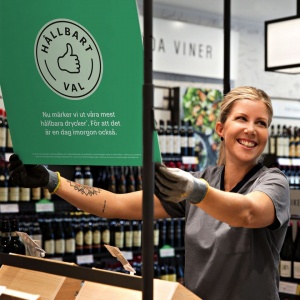Scandinavian monopolies join forces to halve carbon emissions by 2030

Scandinavia’s five alcohol monopolies have announced a joint initiative which aims to combat climate change with a target of slashing carbon emissions in half by 2030.
Sweden’s Systembolaget, Finland’s Alko, Norway’s Vinmonopolet, Iceland’s Vínbúðin and the Faroe Islands’ Rúsdrekkasøla Landsins have collectively revealed their plan to become leading beverage businesses in sustainable development, with the specific target of CO2 emissions to be half their 2019 levels.
This will be achieved by taking action at every stage of the production process, from cultivation right through to packaging and distribution. The Norwegian monopoly Vinmonopolet concedes that it is unclear how this ambitious target will actually be reached, with Rolf Eriksen, the organsiation’s director of sustainability, climate and environment saying: “How we are going to reach our goal of 50% reduction is not yet defined in details. There are many aspects in this; what we are able to measure, how we measure it, what we are able to affect.”
However, the new coalition has agreed on a number of specific targets, including minimizing suppliers’ use of heavy glass bottles, the use of low carbon footprint packaging, and the use of recycled material. It also aims to maximise the recyclability of their packaing, eliminate unncesary packaging, implement best practices for energy efficiency and low cabon transportation, as well as for soil health, agrochemiclas, biodiversity, circularity, water use, energy use and greenhouse gas emissions.
For the plan to achieve its target, the group acnowledge that it must concentrate on the highest volume of wines beers and spirit products. Lighter weight glass will have to beome more widely used, while use of bag in box will be encouraged, as well as the use of PET bottles, TetraPaks and other alternative packages. Cans will similarly be a greater focus for beer and possibly wine.
The various monoplies regard the plan as a framework for their own individual markets, and they will meet on a regular basis to share their experiences and best practice. The Swedish Systembolaget appears to be leading the group, having the most detailed plans and clearest targets, with the other monopolies not ready to divulge their specific targets or how they will go about achieving them.
Across all the regions there is already a high level of consumer awareness of environmental issues and recycling levels are over 90%, rising to over 98% in Norway. Finland’s recycling rate has been boosted by a deposit refund scheme, which has resulted in a return of 97% for cans, 90% for Pet botgtles and 98% for glass bottles.
